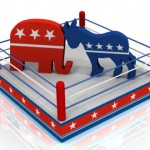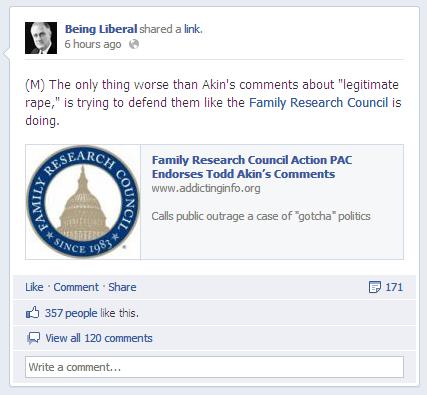 Have you ever wondered why social media users hold such strong opinions? This year’s Presidential election has warmed the American political landscape, almost to a boiling point. Citizens are letting their beliefs dictate their actions, turning everyone who has an opinion to become a messenger to those who lack a strong opinion.
Have you ever wondered why social media users hold such strong opinions? This year’s Presidential election has warmed the American political landscape, almost to a boiling point. Citizens are letting their beliefs dictate their actions, turning everyone who has an opinion to become a messenger to those who lack a strong opinion.
I work with two of the most politically charged individuals that ever breathed bi-partisan air. One is decidedly a progressive Liberal, and the other is a staunch conservative. During the 2008 election I endured 2 hours per day of getting argued with over hypothetical abortion scenarios, the Pinochet regime, the environment and wealth redistribution; I spent another 2 hours getting preached at about the constitution, a myriad of failed socialist governments, the perils of too much government regulation and the right to bear arms. It ended up getting so aggravating that I moved my desk to a separate floor.
It shouldn’t surprise you that the conservative co-worker’s first activity of every work day was to catch up on the latest political news, via The Drudge Report. Likewise, the liberal co-worker would get the same stories, with an entirely different spin, through The Huffington Post.
Confirmation Bias
Their preferences are both an example of confirmation bias. Confirmation bias exists when people favor information that supports their opinions or existing beliefs. Confirmation bias can manifest itself in the selective gathering of information (using information from a clearly biased source) and also during the interpretation of information. You’ll notice that strong supporters of certain positions will almost exclusively quote articles from sources dedicated to publishing biased material.

Nearly every article shared by the Being Liberal Facebook page is sourced from a clearly biased publisher. This post links to addicting info .org, a website that is much more biased than the Huffington Post – even though the story was posted on more reputable news sources.
One study recounted in Jonathan Baron’s “Thinking and Deciding” demonstrated an effect called attitude polarization, which is essentially the roots of confirmation bias as it pertains to new information. The experiment involved two groups of people drawing a series of red and black balls from one of two concealed bags. All of the subjects were informed ahead of time that one basket had an overall makeup of 60 percent red balls and 40 percent black, and the other bag a makeup of 60 percent black and 40 percent red. The experimenters isolated the series of draws when balls of alternating color were drawn for several turns, a sequence that does not favor either basket.
The first group of subjects was asked to proclaim whether they thought that they were drawing from the primarily black bag or the primarily red bag after each turn. The second group was only asked after they completed a series that favored neither side. The first group was found to have assigned a higher probability of their original guess after each successive turn, and to have ended with a much higher probability than the second control group. This suggests that merely holding a belief does not cause polarization, but previously stating your belief does. Once a person acknowledges their viewpoint, they become increasingly attached to it in spite of supporting evidence.
When it comes to new information, people are heavily influenced by the first information that they’re exposed to. Combating an existing bias is much harder than influencing people on a subject that they have never been exposed to. Sometimes it is more important to be first
The Huffington Post: A Lesson in Biased Demographics
Since the development of strong confirmation bias is associated with the public proclamation of that sentiment, we’re able to easily identify large groups of biased individuals. After they publicly acknowledge their opinion, they’re programmed to identify and prefer a publication that is in line with their beliefs.
While Arianna Huffington may have been the liberal media queen of the last decade, it wasn’t always so. Prior to the development of the Huffington Post, Arianna Huffington was an active Republican with extreme views for the time. Arianna’s first foray into online publishing was Resignation.com; a website that called for the resignation of Bill Clinton. For some reason toward the end of the millennium Huffington shifted her political views, which is a very rare thing for a political pundit to do. She created The Huffington Post, which became the most popular blog in the world, and the rest is history.

In 2003 Arianna Huffington ran as an Independent in the California Gubernatorial Recall Election. He primary opponent was Republican Arnold Schwarzenegger. After dropping out, she shifted all her efforts toward fighting to defeat the recall in support of Gray Davis.
In a recent Pew Research Study, it was found that 60 percent of people who identify themselves as liberal use social networking sites, compared to 49 percent of people who identify themselves as conservative. It shouldn’t come as a surprise to anyone who has a Facebook account to find out that social media users are skewed to the liberal side of the spectrum, but would it surprise you to know that users who identify themselves as liberal are twice as likely to block of unfriend someone who posts something that they disagree with, and three times as likely to block or unfriend someone who responds with discourse to a comment of theirs.
Considering that when it comes to polarizing subjects that people tend to gravitate toward information sources that support their beliefs, this gives the Huffington Post a major advantage when it comes to social media marketing. Not only is a larger percentage of people who would be inclined to agree with, and therefor share a liberal viewpoint active on social networking sites, but they are far more likely to block people that are inclined to share content from a source that doesn’t have a liberal bias.
Do you think that Arianna Huffington foresaw that social media would afford a liberal news website a major advantage in propagating their content? Despite Bill Clinton’s public sexcapades, I thought that pursuing his resignation was a little extreme. Huffington’s propensity for polarizing viewpoints was aligned with liberal users’ propensity for confirmation bias. Whether she realized that there was a need for an online news source with a liberal slant, or that a liberal version of The Drudge Report would be afforded many advantages in the evolving online landscape, I believe that the business opportunity that she was faced with is a big part of her decision to flip flop on her political identity.
As a blogger, it is important to identify your beliefs, and research the audience who shares those beliefs. If you cover issues that are naturally polarizing, objectivity will likely limit your audience. You would likely have better results representing a large minority than you would by staying neutral.
Is Bias More Prevalent Online?
A study conducted by Stanford University looked at opponents and proponents of capital punishment. After exposing the subjects to information supporting or confirming capital punishment, it was found that citing a short statistic could slightly sway the viewpoint of each subject, but after exposing them to the full study, subjects almost always returned to their original belief regardless of the evidence. To justify their belief, subjects would point to information that supported them, and disregard other information. They were also quick to criticize the validity of research that contradicted their original belief.
In a related study that was carried out during the 2004 Presidential election, researchers gave subjects a pair of contradicting statements made by each candidate, John Kerry and George W. Bush – as well as a third non-partisan figure. There is little surprise to find that the subjects were more likely to identify the candidate they opposed as contradicting himself; and the results varied widely among subjects with different party affiliations.
The telling part of the study came when researchers placed the subjects in an MRI scanner while they made their judgments. Only when the subject was evaluating contradictory statements by their candidate of choice was the areas of their brain associated with emotion aroused. Researchers inferred that subjects were actively reducing the cognitive dissonance associated with their favored candidate’s irrational behavior.
This tells us that an audience that disagrees with a polarizing viewpoint will be a much tougher audience; focusing on faults and shortcomings, while actively suppressing valid information that supports a conflicting viewpoint. In the case of extremely polarizing subjects such as politics, the behavior is likely so prevalent that any information presented will push readers further toward their own bias. It also tells us that bias is more powerful when people have publicly supported a belief in the past.
In an environment like Facebook where users are bombarded with new information on a regular basis, this could be driving their bias, regardless of the sentiment involved.
Using Superior Insight to Your Advantage
Understanding confirmation bias will allow you to better target niches for new media websites and blogs, it will help you weigh the supply against the demand, and it’s essential information to have when you craft your strategy or develop publishing standards. The most important thing is to be aware of how bias affects your niche and alter your strategy to exploit it, or to render it as insignificant as possible.
To deal with the confirmation bias of your audience, the best tactic is to base everything on facts that have been tested and peer reviewed. Cite your sources, and try to avoid juxtaposing facts with untested opinion in an effort to get the reader to read into your beliefs as factual.
- Cite your sources
- Develop a reputation for accuracy
- Respect the opinion of others
- Manage your community fairly
- Be as transparent as possible
- Avoid highly polarizing topics unless you’re ready to defend your position
You also need to identify and address your own confirmation bias. At Social Media Sun we try to be as objective as possible. The good thing is that our writers have very little topical bias. There are some people that deliberately publish articles that call for the death of SEO, the weaknesses of social media or the diminishing value of PPC, but it can usually be traced back to their original area of expertise. Don’t ever let an SEO talk you out of doing social media, a PPC organization talk you out of SEO, or a social media expert talk you in to anything if they are constantly badmouthing traditional marketing.
Understanding bias will give you a distinct advantage in everything you do online. It could be the difference in becoming the next Ariana Huffington, or the next Westboro Baptist Church. Make your decisions informed ones, be aware of existing bias, and visit Social Media Sun everyday because 100% of the people who wrote this article prefer it to the American Express OPEN Forum. How does confirmation bias affect your blogs or marketing campaigns? Can you think of ways to use it to your advantage?
- Blogging Isn’t a Rocket, It’s More Like a Roller Coaster - August 19, 2025
- Value vs. Expectations: The Fight for Startup Survival - July 31, 2025
- The Evolution of Marketing: From Catalogs to Cat Blogs - November 8, 2022
- How to Make a Tweet This Link - February 5, 2022
- Dramatically Improve Marketing Results with Advanced Analytics - September 20, 2021
- The Next Chapter for Social Media Sun - June 4, 2013
- Optimizing Your FAQ to Maximize ROI - December 5, 2012
- Weapons of Influence and Klout’s Role in Marketing - November 17, 2012

this is perhaps one of the more interesting content marketing blogposts i’ve seen in a while! heh,, funny that you work with extremes on the left and the right, must give you lots of fodder for thought… kudos to you, adam!
Thanks Jim. I get tired of seeing the same old stuff myself, but there are lots of more advanced topics that leave room for interpretation that others have published little on. Bias is such a strong force in online publishing and content marketing that it surprised me that others hadn’t published interesting pieces on the topic.
Thank you for reminding me to check back in on http://youarenotsosmart.com/
I might have missed it in the analysis of the data, but age seems to be the biggest factor when discussing how social media influences political opinion, thus policy. I can’t help but wonder if you also thought about the tv/radio Kennedy/Nixon debate while writing this article. I certainly did while reading it.
I was getting ready to delete your comment when I saw the link, but after reading the comment twice and looking at that website, pretty relevant share Zachary, Thanks.
To me, your comment points out as much how me and David (the author of that blog) are just as much subjected to the fact that we’re not that smart – even in realizing that and exploring it, we’re just breaking through one layer of our own ignorance, and it may not even be a better place to be than fully ignorant.
I don’t think age has as much to do with it as you think, but I’m sure there is some correlation; probably more to do with how easily one can arouse another’s bias than any affinity to one party or another. I thought more about recent presidencies, but it did in fact call to my mind Nixon / Kennedy, and even went back to when Teddy Roosevelt ran as an Independent. I’d love for you to add your opinion about how the TV played into bias in those elections during the time that it became more prevalent.
I truly believe the bias exhibited by the far leaning right is more likely to exemplify prejudice and discrimination than that of the far leaning left. It is important not to equate them.
Then you haven’t saw my Facebook feed. There have been 2 right wing posts that have had inaccurate “facts” this election cycle. I have saw so many liberals post inaccurate “facts” this election cycle that I lost count at about 25 – and I’m talking about information that is released to the public through the Department of Labor, the Federal Treasury, the EPA, and several other government organizations.
They are also treating Mitt Romney like trash, even though Mitt Romney has largely refrained from attacking Barack Obama’s character. I don’t like Mitt Romney either, but from what I know he’s a good guy – he’s the only Republican that isn’t asking for Obama’s birth certificate. I’m embarrassed to be a Democrat this year because the far left is going way too far, and the moderates are following them. If things don’t change, I’m going to re-register as an independent after this election.